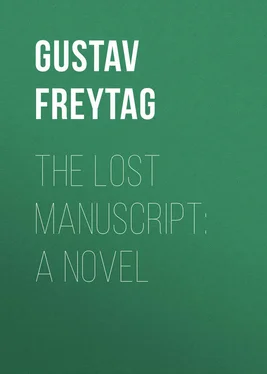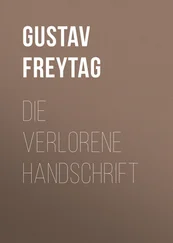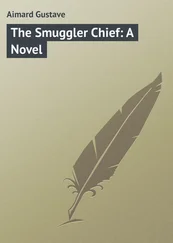Gustav Freytag - The Lost Manuscript - A Novel
Здесь есть возможность читать онлайн «Gustav Freytag - The Lost Manuscript - A Novel» — ознакомительный отрывок электронной книги совершенно бесплатно, а после прочтения отрывка купить полную версию. В некоторых случаях можно слушать аудио, скачать через торрент в формате fb2 и присутствует краткое содержание. Жанр: foreign_antique, foreign_prose, на английском языке. Описание произведения, (предисловие) а так же отзывы посетителей доступны на портале библиотеки ЛибКат.
- Название:The Lost Manuscript: A Novel
- Автор:
- Жанр:
- Год:неизвестен
- ISBN:нет данных
- Рейтинг книги:5 / 5. Голосов: 1
-
Избранное:Добавить в избранное
- Отзывы:
-
Ваша оценка:
- 100
- 1
- 2
- 3
- 4
- 5
The Lost Manuscript: A Novel: краткое содержание, описание и аннотация
Предлагаем к чтению аннотацию, описание, краткое содержание или предисловие (зависит от того, что написал сам автор книги «The Lost Manuscript: A Novel»). Если вы не нашли необходимую информацию о книге — напишите в комментариях, мы постараемся отыскать её.
The Lost Manuscript: A Novel — читать онлайн ознакомительный отрывок
Ниже представлен текст книги, разбитый по страницам. Система сохранения места последней прочитанной страницы, позволяет с удобством читать онлайн бесплатно книгу «The Lost Manuscript: A Novel», без необходимости каждый раз заново искать на чём Вы остановились. Поставьте закладку, и сможете в любой момент перейти на страницу, на которой закончили чтение.
Интервал:
Закладка:
Ilse drew back into the grotto and gathered her hair into the net she held in her hand. The Professor stood at the entrance of the sanctuary; near him hung the long shoots of the blackberry, the bees hummed over the wild thyme, and his heart beat. When Ilse, with blushing cheeks, stepped out of the grotto into the light of day, she heard her name uttered by a voice in deep emotion, she felt her hand pressed, an ardent look shot from those true eyes, sweet words fell from his lips, his arm clasped her, and she sank silently on his heart.
As the Professor himself on another occasion had explained, man sometimes forgets that his life rests on a compact with the overwhelming powers of nature, which, unawares, influence the little lords of the world. Thus similar unexpected powers now controlled the Professor and Ilse. I know not what agencies of nature sent the bees, or threw the shoe. Was it the elves in whom Ilse did not believe? Or was it one of the antique acquaintances of the Professor, the goat-footed Pan, who blew his reed-pipes in the grotto?
The wooing had begun in a scientific manner, but it had been brought to a conclusion with little wisdom and without any regard for formality.
CHAPTER XI .
SPITEHAHN
Raven-black night brooded over the hostile houses. The world looked like a great coal-pit in which the lights had been extinguished. The wind howled through the trees of the park. A rustling of leaves and crackling of branches was heard. Nothing was to be seen but a monstrous black curtain that concealed the neighboring woods and a black-tented roof which was spread over the houses. The streets of the city were empty. All who loved their beds had long been lying therein, and whoever possessed a nightcap had now pulled it over his ears. Every human sound was silenced; the striking of the tower-clock was interrupted by the stormy winds, and each tone was driven hither and thither, that no one could count the midnight hour. But around the house of Mr. Hummel the yelping dogs pursued their wild career in the courtyard, undaunted by storm or darkness; and when the wind blew like a bugle-horn between the houses, the pack dispelled sleep from men by their clamor and din.
"This night suits them well," thought Gabriel, in his room. "This is just the weather for them." At last he slept, and dreamt that the two dogs opened the door of his room, placed themselves on two chairs before his bed and alternately snapped their pocket pistols at him.
As he was lying in this unquiet sleep, there was a knock at his door.
"Get up, Gabriel!" called out the old porter from the factory; "an accident has happened."
"Through the dogs," exclaimed Gabriel, springing out of bed.
"Some one must have broken in," cried the man again, through the door, "the dogs are lying on the ground."
Gabriel, alarmed, put on his boots and hastened into the yard, which was dimly lighted by the dawn. There lay the two poor watch-dogs on the ground, with no other sign of life than helpless writhing. Gabriel ran to the warehouse, examined the door and windows, and then the house; every shutter was closed, and no sign of disturbance could be discovered. When he returned, Mr. Hummel was standing before the prostrate dogs.
"Gabriel, a dastardly deed has been perpetrated here. Something has been done to the dogs. Let them both lie there; an investigation must be made. I will send for the police."
"Indeed?" answered Gabriel; "compassion should come first, then the police. Perhaps something may yet be done for the poor brutes."
He took the two animals, carried them to the light, and examined their condition.
"The black one is done for," he said, compassionately. "The red one has still some life in him."
"Go to the veterinary surgeon, Klaus," exclaimed Mr. Hummel, "and ask him to do me the favor to get up at once; he shall be remunerated. This case must be put into the morning paper. I require satisfaction before the magistracy and town council. – Gabriel," he continued, in angry excitement, "the dogs of citizens are being murdered: it is the work of low malice, but I am not the man to put up with such assassins. They shall be made an example of, Gabriel."
Meanwhile Gabriel stroked the fur of the red dog, which rolled its eyes wildly under its shaggy brow and stretched out its paws piteously.
At last the veterinary surgeon came. He found the whole family assembled in the court. Mrs. Hummel, still in her night-dress, brought him a cup of coffee, while drinking which he sympathized with them, and then began the examination. The verdict of the expert pointed to poisoning. The dissection showed that a little dumpling with arsenic had been eaten, and, what vexed Mr. Hummel still more, there were glass splinters besides. For the red dog there was a doubtful prospect of recovery.
It was a gloomy morning for the Hummel family. Before breakfast Mr. Hummel sat down to his writing table and wrote out an advertisement for the daily paper, in which ten dollars reward was offered to any one who would make known the name of the malignant poisoner of his dog. The ten dollars were underlined with three dashes. Then he went to his window and looked savagely upon the haunts of his opponent and on the Chinese temple which had been the occasion of this new disturbance. Finally he began to pace up and down the room, turning to his wife as he passed and muttering:
"I have not the slightest doubt about the matter-not the slightest doubt."
"I do not understand you," answered his wife, who on this trying morning was taking a second breakfast; "and I do not understand how you can be so positive in this matter. It is true, there is something about those people that has always been repugnant to us, and it may be a misfortune to have such neighbors. But you have no right to assume that they have poisoned the dogs. I cannot think that such an idea could have entered into the head of Mrs. Hahn. I admit that she is an ordinary woman. Moreover, the doctor says it was dumplings; which points to a woman as the guilty person. But when our red dog was caught running off with the snipe they were going to have for dinner, she sent me back the dog with her compliments, saying she thought it was not good behavior in him, as he had eaten three of the birds. That was civil, and I can find no murderous intention in it. And he surely does not look as if he would do anything to our dogs at midnight."
"He is a treacherous fellow," growled Mr. Hummel; "but you have always had your own opinion about those people. He has played the hypocrite toward me from the very first day, when he stood by his pile of bricks before these windows and turned his back upon me. I have always allowed myself to be persuaded by you women to treat him as a neighbor, with greetings and civil speeches; and I have always been silent when you have carried on your idle gossip with the woman over there."
"Our idle gossip, Henry," exclaimed the wife, setting down her coffee-cup with a clatter; "I must beg of you not to forget the respect that is due to me."
"Well, well, I meant no slight," Mr. Hummel hastened to add, hoping to allay the storm which he had inopportunely brought upon himself.
"What you meant, you, of course, know. I take it as I heard it. But it shows little feeling in you, Mr. Hummel, for the sake of a dead dog to treat your wife and daughter as idle gossips."
This disagreement added still more to the gloom and ill-humor of the morning, but did not in any way advance the discovery of the culprit. It was in vain that the mistress of the house, in order to divert her husband's suspicions from the Hahn family, raised many other conjectures, and, with Laura's help, tried to throw the blame on their own employés or the watchman, and that she at last suggested even the shop-porter over the way as the possible evil-doer. Alas! the reputation of the dogs was so dreadful that the Hummel family could more easily count the few people who did not wish evil to the dogs, than the many whose wish and interest it was to see the monsters at the bottom of Cocytus. The news ran like wildfire through the streets, a crowd gathered around the fruit-woman at the corner, and people spoke of the evil deed everywhere, pitilessly, hostilely, and maliciously. Even among those in the streets who tried to show outward signs of sympathy, the prevailing feeling was hardly concealed. It is true there were some sympathisers. First Mrs. Knips, the washerwoman, with voluble indignation; then even Knips the younger ventured pityingly into the neighborhood of the house-he was clerk in the hostile business, having gone over to the enemy, but never ceased to show respect to his former instructor on all occasions, and to pay unacceptable homage to Miss Laura. At last the comedian of the theatre, whom they generally invited on Sundays, came, and related many amusing stories. But even these few faithful adherents were suspected by some of the household. Gabriel distrusted the Knips family, while Laura detested the clerk, and the comedian, formerly a welcome guest, had, some evenings before, in passing by, inconsiderately expressed to a companion, that it would be a praiseworthy deed to remove these dogs from the stage of life. Now this unhappy suggestion was repeated to the mistress of the house, and it lay heavy on her heart. For fifteen years she had accepted this man's homage with pleasure, shown him much friendliness, and given him enthusiastic applause at the theatre, not to speak of the Sunday dinners and preserves. But now when the gentleman lowered his head sympathisingly and expressed his horror and indignation at the deed, his face, from the long habit of comic action, lengthened itself so hypocritically, that Mrs. Hummel suddenly fancied she saw a devil grinning out of the features of the once esteemed man. Her sharp remarks about Judases frightened in turn the comedian, revealing to him the danger of losing his best house of entertainment, and the more dolorous he felt, the more equivocal became his expression.
Читать дальшеИнтервал:
Закладка:
Похожие книги на «The Lost Manuscript: A Novel»
Представляем Вашему вниманию похожие книги на «The Lost Manuscript: A Novel» списком для выбора. Мы отобрали схожую по названию и смыслу литературу в надежде предоставить читателям больше вариантов отыскать новые, интересные, ещё непрочитанные произведения.
Обсуждение, отзывы о книге «The Lost Manuscript: A Novel» и просто собственные мнения читателей. Оставьте ваши комментарии, напишите, что Вы думаете о произведении, его смысле или главных героях. Укажите что конкретно понравилось, а что нет, и почему Вы так считаете.












